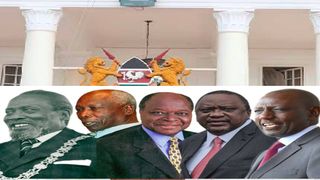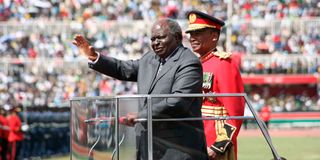
Kenya's former Presidents from left: Mzee Jomo Kenyatta, Daniel arap Moi, Mwai Kibaki, Uhuru Kenyatta and President William Ruto.
|Kenya@60
Premium
Corruption: Time to break the jinx of Kenya's past regimes 60 years on
Kenya attained internal self-rule from the British on June 1, 1963, full of optimism for a bright future. Independence followed six months later. But with the 60th birthday of internal self-government this year, the nation’s congenital challenges are intact, thanks to an extractive and acquisitive State.
The independence top brass in 1963 put the country on an unstable path that Tom Mboya, one of the architects of Project Kenya, agonised about in his book aptly titled The Challenge of Nationhood.

President Jomo Kenyatta marks Madaraka Day in 1973 with First Lady Mama Ngina.
Six decades on, the challenges only seem to have blossomed into a difficult maturity. The lowest common factor is the role of sleaze in government, with the proceeds often going towards funding political competition, in a curious cyclic ebb and flow of national life.
To its credit, the independence State identified ignorance, poverty and disease as the three main enemies to be fought, in line with First President Jomo Kenyatta’s inaugural address. The rest of the ethos were captured in the National Anthem.
The canticle talks of a people dwelling in peace and unity in a just God-blessed land with massive wealth. It goes on to define service as an earnest endeavour, among a people firm to defend a homeland that is a heritage of splendour. The idyllic dream concludes by painting pictures of a common bond among a people who see themselves as builders of a glorious commonwealth in which the fruits of labour fill all hearts with gratitude.
The emphasis on the fruit of labour would seem to preclude celebration of financial tackiness and scandal of the proportions that Kenya has witnessed for the six decades. But does all this seem to have been for ink and paper fit only for the archives?
Once the business of government began in earnest, all the big dreams were placed on the back burner and eventually consigned into insignificant ceremonial relevance. Official functions in dozens of events across the republic begin and end with the National Anthem, virtually every day.
They sing it in schools, at the local chief’s meetings and in sundry public activities and events. In police stations, life comes to a standstill twice a day as the national flag goes up at 6am and when it is pulled down at 6pm. The ceremony evokes the significance borne in the anthem that often goes with it on other occasions. And at some of Kenya’s proudest moments, the anthem has been played to the silent attention of the whole world as the country’s world-beating sports stars receive medals of glory.
However, all that seems to be just that. It is a good glorious sound whose wider relevance has since been faded into insignificance by a history of extraction and acquisition in the ruling class.
Quite early on, Kenyatta was in the habit of chiding his detractors with the refrain “Even Independence did not come to us on the silver platter; we grabbed it”. He often used the Kiswahili expression nyakua (grab) to signify the path to comfortable living. He especially reproached three of his former inmates in a colonial detention camp thus: “Look at me. Look at Paul Ngei and look yourselves. See what we have done for ourselves. Were we not with you in Kapenguria (detention)? See what we have done for ourselves. What have you done for yourselves?”
This was followed by a string of stinging invectives that pointed out the way to Ramogi Achieng Oneko, Kung’u Karumba and Bildad Kaggia. The benefits of government were defined as leverage and extra-legal-to-illicit access to public coffers.

President Moi inspects a guard of honour mounted by the army, navy and the air force on Madaraka Day.
Infamously, the Duncan Ndegwa Commission of 1971 on public service structure and remuneration allowed public servants to do business with the government. In principle, this is frowned upon today. We could even say it is outlawed by the Public Procurement and Asset Disposals Act, 2015, within the prism of conflict of interest. However, tenders for public supplies are some of the most sought-after opportunities. There has emerged, in Kenyan parlance, the term “tenderpreneurs”. These deep-heeled individuals are supposed to be legitimate suppliers to government, both at the national and county levels, of goods and services that are sometimes worth billions of dollars.
Public finance, procurement and audit are the most valued assets by the political class. He who has them neatly sewn up together has a goldmine. When President Mwai Kibaki came to office in 2002, one of his first assignments was to shake up the three sectors and tie them up afresh.
Giving the aura of reform, his Minister for Finance, David Mwiraria, sent all procurement officers on compulsory leave, pending what was billed as a cleaning up of the system. It turned out, however, that it was all about replacing one system’s troops with those of a new one, for the same assignment.
President Kibaki’s renegade anti-corruption czar, John Mark Githongo, would later be quoted by author Michela Wrong as having been bewildered by undisguised assault on public coffers by the newly arrived political elite, with some of them proclaiming openly within the corridors of power: “It is our turn to eat.”
The need to eat has led to a succession of lopsided public service honchos. For a start, the appointing authority picks strategically from his tribe, with a sprinkling of compliant allies from a few other communities. The tribesmen should also be compliant to migration of public resources into selected private hands. It is a self-succeeding prebendal State, associated with numerous scandals.
In the early years of independence, there was the maize scandal, which played out around Cooperatives and Marketing Minister Paul Ngei. In the middle of a maize shortage in the country, Ngei’s ministry imported 250,000 bags of yellow maize to the now extinct Maize Marketing Board. His family became the sole supplier of the maize to retail outlets. While he was suspended from Cabinet for a few months, Parliament was arm-twisted into enacting a law that allowed Kenyatta to pardon and reinstate him.
But the President was also fond of telling off his detractors on the economy and cost of living with words to the effect that he had brought down an elephant. It was up to everyone to hone their knife and hive off their cut. It was not his fault that some had blunt knives, or no knives, or even that those with good knives did not know how to chop off a piece for themselves.

Former President Mwai Kibaki and Chief of General Staff Jeremiah Kianga during the 48th Madaraka Day.
Hence, Kenyatta’s watch stumbled from one scandal to another—from maize to cashew nuts, and from cashew nuts to coffee smuggling and from here to gemstones and ivory theft and poaching in the game parks. In the Ken-Ren scandal of the 1970s, for instance, taxpayers would eventually lose Sh6.33 billion for fertiliser and farm chemical factory that never was. The State still harbours ambitions to build such a facility.
This philosophy has since seen the country lose prime public assets into private hands.
Politically correct top cats
In the Nyayo years (1978–2002), forests were alienated and apportioned into parcels that were allocated to politically correct top cats. Public car parks in Nairobi’s central business district, city council houses in prime residential suburbs and State corporations’ houses, as well as public roads, all fell into extractive and acquisitive private hands.
It was in this regard, for example, that Prof Wangari Maathai and other members the Greenbelt Movement became regular inmates in police cells for fighting to save Karura Forest in Kiambu, adjacent to Nairobi, from State-driven land grabbers. In 1989, the late Nobel laureate would wage a successful war in the courts and through an international campaign to save Uhuru Park from plans by President Daniel Moi’s government to build a 60-storey office complex for the ruling party Kanu in the only green space in Nairobi’s CBD.
The Goldenberg and Anglo Leasing scandals were about extraction and acquisition by the centre, both under Moi and Kibaki. The Eurobond scam under former President Uhuru Kenyatta has vaporised into thin air. So, too, has the National Youth Service twin scam, the Covid-19 billionaires scam, Afya House scandal, mobile clinics affair, hired medical equipment saga and mysterious goings-on in the Galana-Kulalu irrigation scheme, Kimwarer and Arror dams affair and the standard gauge railway billions mystery.

President Uhuru Kenyatta arrives at Uhuru Gardens on June 01, 2022 to mark Madaraka Day.
In the Eurobond matter, billions of shillings borrowed offshore melted into thin air. The rest have each sunk their own billions into mysterious space. In the wake of Uhuru’s exit from office, the Controller of Budget has been quizzed over the loss of Sh23 billion to Sh40 billion that was irregularly withdrawn from public coffers. She says it was based on “pressure from above”.
There are examples galore of personal empires of graft across diverse sectors and industries, including oil and petroleum, agriculture, security, education, wildlife and public works. Wherever the eyes turn, they tend to run into scandal, with elite political families in the frame. The big irony is that a lot of the looted funds end up being spent on elections that favour the same persons. Here, the mantra would seem to be “We will vote for those who have treated us well during the campaigns”.
Pain and suffering
The voting public is partly responsible for theft from the public coffers, with the resultant collective pain and suffering. It is a curious cyclic situation, where a public that decries corruption will still vote significantly on the basis of cash handouts. They will then go on to complain about corruption in government.
The culture seeps down from one generation to the next with the odd role model for subsequent generations. It should not surprise anyone that the challenges have become hardcore 60 years later.
Emerging whiffs of corruption under Kenya’s fifth President, Dr William Ruto, suggest that the country is far from the woods. Already, tell-tale signs point to ongoing population of strategic places in public finance, procurement and audit with his own people, in the style of those who have gone ahead of him.
Initial handling of scams at the Kenya Medical Supplies Authority and the Kenya Bureau of Standards suggest that it could be different this time. But it is too soon to say anything definitive.
The country is in dire need of a new leadership ethos that will realign it with the original dream. Nothing short of a no-nonsense Lee Kuan Yew (former prime minister of Singapore) type will save it. So far, the war against corruption has been a lip service affair. All pledges to fight corruption evaporate the moment the words leave the leaders’ lips.
A thorough ruthlessness with the President chastising himself and all around him is the starting point. President Ruto cannot afford the luxury of, like all those before him, lamenting about corruption and doing nothing about it—or even seeming to encourage it. He has to act, and act fast. If the fifth presidency does not become the turning point, it will be difficult to imagine what could save the country.
Dr Galava, a former managing editor with the ‘Nation’ and ‘The Standard’, is managing partner at Athari Communications. [email protected], @DenisGalava





